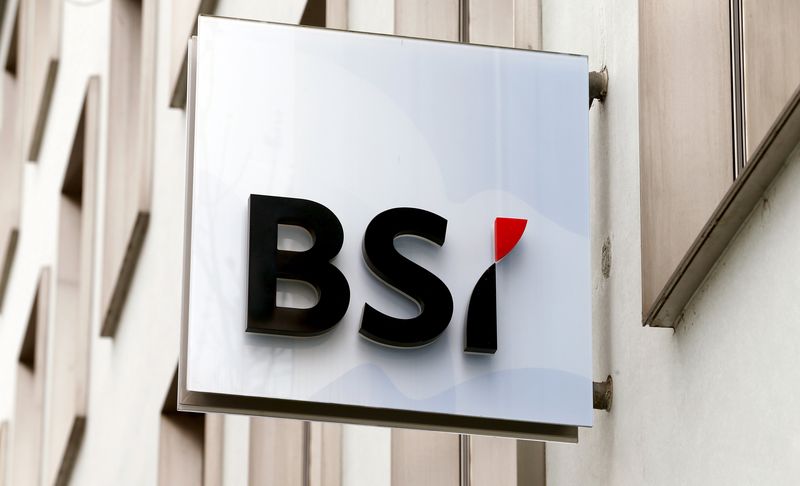By Douwe Miedema, Karen Freifeld and Alice Baghdjian
WASHINGTON/ZURICH (Reuters) - Swiss bank BSI has become the first of what is expected to be several dozen Switzerland-based private banks to reach a deal under a voluntary disclosure programme for tax-related offenses being run by the U.S. Department of Justice.
The programme, launched in 2013, allows Swiss banks to avoid prosecution by coming clean about their cross-border business in undeclared U.S.-related accounts, though it excluded banks already under criminal investigation in relation to their Swiss activities.
Under a non-prosecution agreement signed on Monday, Lugano-based BSI will pay a $211 million (142.73 million pounds) penalty after admitting it had for decades assisted thousands of U.S. clients in opening accounts in Switzerland and hiding assets from tax authorities.
The agreement is being closely watched in Switzerland because lawyers and analysts expect it to be the first of a flood of settlements by Swiss banks, which have come under intense pressure to give up their traditional secrecy.
"We believe that the issue will be resolved by the end of the year," Vontobel analyst Andreas Venditti wrote in a note concerning the remaining banks in the programme.
The head of Swiss financial watchdog FINMA, which had lambasted BSI for breaching obligations to identify, limit and monitor risks involved in dealings with U.S. clients, said the settlement was a positive sign for other banks in the programme.
"The fact that the matter is moving is to be taken positively and we very much hope it brings more momentum in this process," Mark Branson told reporters in Berne on Tuesday.
In addition to the DoJ's voluntary disclosure programme, a smaller group of Swiss banks have faced criminal investigations by U.S. authorities for allegedly helping wealthy Americans evade taxes.
In May, Credit Suisse (VX:CSGN) pleaded guilty to helping Americans avoid paying taxes and agreed to pay more than $2.5 billion in penalties, while crosstown rival UBS (VX:UBSG) paid $780 million and admitted wrongdoing in a 2009 settlement of a Justice Department tax-evasion probe.
Criminal investigations are continuing into others including Julius Baer (VX:BAER), Zuercher Kantonalbank and HSBC's (L:HSBA) Swiss private bank. Venditti said BSI's settlement would have no effect on these investigations.
UNDECLARED ACCOUNTS
BSI held and managed approximately 3,500 U.S. client accounts, including declared and undeclared accounts, with peak assets under management since August 2008 of $2.78 billion, the DoJ said. BSI's fine corresponds to around 7.5 percent of this peak U.S. asset base of declared and undeclared accounts.
BSI chief Stefano Coduri declined to tell reporters what proportion of assets the DoJ had deemed undeclared, making it difficult to use the fine as a benchmark for future settlements.
BSI did not disclose client details but the DoJ said it had provided information, in compliance with Swiss privacy laws, on numerous U.S. client accounts held in Switzerland, sufficient to make treaty requests to Swiss authorities for account records.
BSI, which belongs to Italian insurer Generali (MI:GASI), still prompted a stinging rebuke from Swiss finance blog Inside Paradeplatz, which wrote that BSI had betrayed Switzerland's banks and wealth managers "to save its own skin", in reference to the fact that BSI had provided the names of employees who had committed misconduct.
Generali said it had provisioned for the $211 million fine in its 2014 results. The agreement paves the way for completion of BSI's sale to Brazil's Banco BTG (LONDON:BTG) Pactual SA
BSI acknowledged that it issued pre-paid debit cards to U.S. clients without their names visible on the card to help them keep their identities secret, U.S. authorities said.
It also said the bank helped U.S. clients create "sham corporations" and trusts that masked their identities.
In some instances, U.S. clients would tell their bankers that their "gas tank is running empty" as code to indicate that they needed more cash on their cards.
BSI apparently had more U.S. account holders than many other banks in the programme, a reason for the sizeable penalty, according to Washington, D.C., attorney Scott Michel, who represents banks and individuals who have made voluntary disclosures.
The BSI agreement also has substantial implications for account holders, the lawyer noted.
If a U.S. taxpayer has an unreported account at a Swiss bank and enters the offshore disclosure programme, the account holder has to pay a penalty equal to 27.5 percent of the high balance in the account, he said.

However, once a bank becomes the publicly announced subject of an investigation or enforcement action, the penalty rises to 50 percent. "For any American with an unreported account at BSI, their effective cost has essentially doubled today," Michel said.